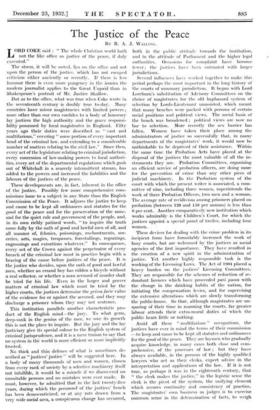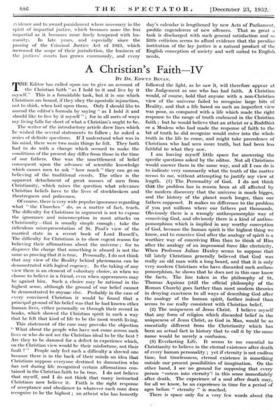The Justice of the Peace
By It. A. J.• WALLING.
LORD COKE said : "The whole Christian world hath not the like office as justice of the peace, if duly executed."
The stress, it will be noted, lies on the office and not upon the person of the justice, which has not escaped criticism either anciently or recently. If there is less humour there is even more pungency in the ironies the modern journalist applies to the Great Unpaid than in Shakespeare's portrait of Mr. Justice Shallow.
But as to the office, what was true when Coke wrote in the seventeenth century is doubly true to-day. . Many countries have minor magistracies with limited lowers; none other than our own confides to a body of honorary- lay justices the high authority and the grave responsi- bility possessed by local magistrates in England. Fifty years ago their duties were described as "vast and multifarious," covering" some portion of every important. head of the criminal law, and extending to a considerable number of Matters relating to the civil law." Since then, every act of the legislature relating to criminal jurisdiction, . every cOneession of law-making powers to local authori- ties,.every set of the.departmental regulations which gush out of Whitehall in a scarcely • intermittent stream, has added to the powers and increased the liabilities and the labours of the justices of the peace.
These developments are; in fact, inherent in the office of the justice. Possibly few more comprehensive com- missions issue to a subject in any State than the English Commissionnf the Peace. It adjures the justice to keep and cause to be kept all ordinances and statutes for the good of the peace and for the preservation of the same, and for the quiet rule and government of the people, and, in its own richly patined words, to inquire the truth more fully by the oath of good and lawful men of all, and all manner of, felonies, poisonings, enchantments, sor- ceries, arts, magics, trespasses, forestallings, regratings, engrossings and extortions whatever." In consequence, every act of the Crown against the perpetrator of every breach of the criminal law must in practice begin with a hearing of the cause before justices of the peace. It is the justice who decides, upon the oath of good and lawful men, whether an errand boy has ridden a bicycle without a real reflector, or whether a man accused of murder shall be tried • for his life.- .Even in the larger and graver matters of criminal law which must be tried by the higher courts, the justices determine the prima fade value of the evidence for or against the accused, and they may discharge a prisoner whom they may not sentence.
This institution parallels another characteristic pro- duct of the English mind—the jury. To what germ,. deep-sunk in the genius of the race, we owe its growth this is not the place to inquire. But the jury and the lay justiciary give its special colour to the English system of criminal jurisprudence, and it is a mere truism to say that no system in the world is more efficient or more implicitly. trusted.
No thick and thin defence of what is sometimes de- scribed as "justices' justice" will be suggested here. In A body of many thousands of men and women, chosen from every rank of society by a selective machinery itself not infallible, it would be a miracle if we discovered no Unsuitable persons and no mistakes were ever made. It must, however, be admitted that in the last twenty-five years, during which the personnel of the justices' bench has been demoeraticized, or at any rate drawn from a- very wide social area, a conspicuous change has occurred, both in the public attitude towards the institution, and in the attitude of Parliament and the higher legal authorities. Occasions for complaint have become fewer ; the justices have been entrusted with larger jurisdictions.
Several influences have worked together to make this period perhaps the most important in the long history of the courts of summary jurisdiction. It began with Lord, Loreburn7s Substitution of Advisory Committees on the choice of magistrates for the old haphazard system of selection by Lords-Lieutenant unassisted, which meant that many benches were packed with persons of certain social positions and- political views. The social basis of the bench was broadened ; political views are now no bar to selection. More recently the sex barrier has fallen. Women have taken their place among the administrators of justice so successfully that, in many departments of the magistrates' work, it would now be unthinkable to be deprived of their assistance. Within the same time the Probation Acts have placed at the disposal of the justices the most valuable of all the in- struments they use. Probation Committees, organizing an efficient service of probation officers, are doing more for the prevention of crime than any other piece of judicial machinery. In the Probation system of the court with which the present writer is associated, a com- mittee of nine, including three women, superintends the work of three Probation Officers, two men and a:woman.. The average rate of recidivism among prisoners placed on probation (between 120 and 150 per annum) is less than 6 per cent. Another comparatively new institution which works admirably is the Children's Court, for which the justices appoint a special panel of twelve, including four women. • • These devices for dealing with the crime problem in its incipient form have formidably increased the work of busy courts, but are welcomed by the justices as social agencies of the first importance. They have resulted in the creation of a new spirit in the administration of justice. Yet another highly responsible task is the working of the Licensing Laws. The Act of 1904 placed a heavy burden on the justices' Licensing Committees. They are responsible for the schemes of reduction of re- dundant licences which have proceeded pan i passu with the change in the drinking habits of the nation, for initiating the compensation levies, and for supervising the extensive alterations which are slowly transforming the public-house. So that, although magistrates are un- sparing of their time in manning the courts, far greater labour attends their extra-mural duties of which the public hears little or nothing.
• Amid all these " multifarious " occupations, the justices have ever in mind the terms of their commission —to keep and cause to be kept all statutes and ordinances for the good of the peace. They are laymen who gradually acquire knowledge, in many cases both close and com- prehensive, of the processes of law ; but they have always available, in the persons of the highly qualified lawyers who act as their clerks, expert advice in the interpretation and applications of the law. If it is not true, as perhaps it was in the eighteenth century, that " the clerk makes the justice," in the legistic sense the clerk is the pivot of the system, the unifying clement which secures continuity and consistency of practice. The magistrates' own business as judges is to exercise common sense in the determination of facts, to weigh evidence and to award punishment where necessary in the Spirit of impartial justice, which becomes none the less impartial as it becomes more finely tempered with hu- manity. In late years, and especially since the passing of the Criminal Justice Act of 1925, -which increased the scope of their jurisdiction, the business of the justices' courts has grown enormously, and every day's calendar is lengthened by new Acts of Parliament, prolific engenderers of new offences. That so great a task is discharged with such general satisfaction and so little criticism seems to afford evidence that the peculiar institution of the lay justice is a natural product of the English conception of society and well suited to English needs.



























 Previous page
Previous page